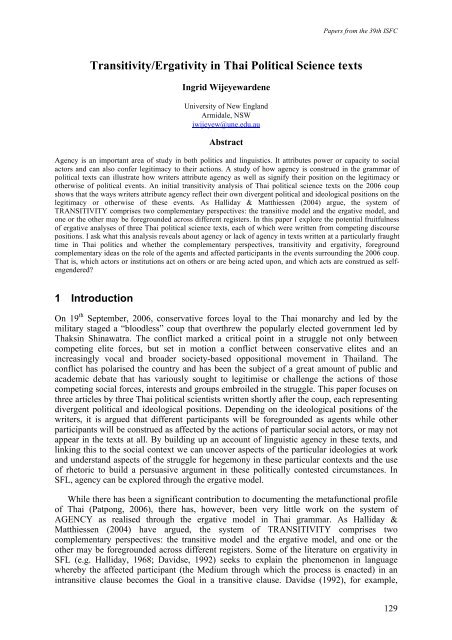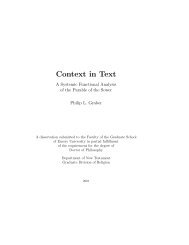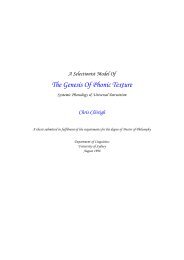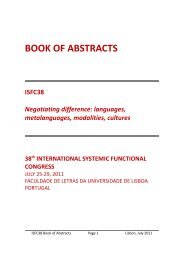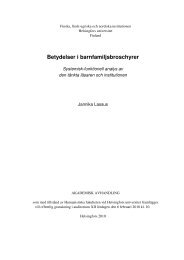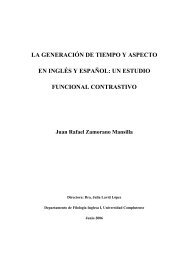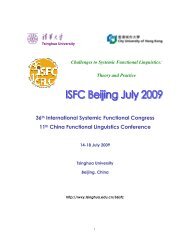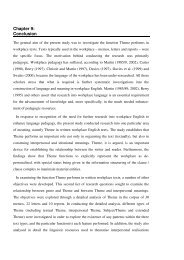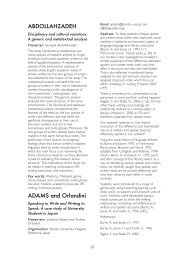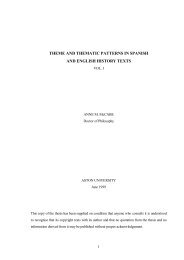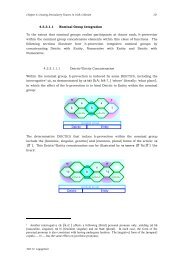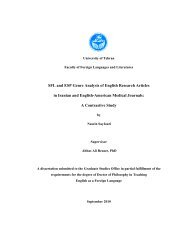the ISFC39 Proceedings - International Systemic-Functional ...
the ISFC39 Proceedings - International Systemic-Functional ...
the ISFC39 Proceedings - International Systemic-Functional ...
Create successful ePaper yourself
Turn your PDF publications into a flip-book with our unique Google optimized e-Paper software.
Papers from <strong>the</strong> 39th ISFCTransitivity/Ergativity in Thai Political Science textsIngrid WijeyewardeneUniversity of New EnglandArmidale, NSWiwijeyew@une.edu.auAbstractAgency is an important area of study in both politics and linguistics. It attributes power or capacity to socialactors and can also confer legitimacy to <strong>the</strong>ir actions. A study of how agency is construed in <strong>the</strong> grammar ofpolitical texts can illustrate how writers attribute agency as well as signify <strong>the</strong>ir position on <strong>the</strong> legitimacy oro<strong>the</strong>rwise of political events. An initial transitivity analysis of Thai political science texts on <strong>the</strong> 2006 coupshows that <strong>the</strong> ways writers attribute agency reflect <strong>the</strong>ir own divergent political and ideological positions on <strong>the</strong>legitimacy or o<strong>the</strong>rwise of <strong>the</strong>se events. As Halliday & Matthiessen (2004) argue, <strong>the</strong> system ofTRANSITIVITY comprises two complementary perspectives: <strong>the</strong> transitive model and <strong>the</strong> ergative model, andone or <strong>the</strong> o<strong>the</strong>r may be foregrounded across different registers. In this paper I explore <strong>the</strong> potential fruitfulnessof ergative analyses of three Thai political science texts, each of which were written from competing discoursepositions. I ask what this analysis reveals about agency or lack of agency in texts written at a particularly fraughttime in Thai politics and whe<strong>the</strong>r <strong>the</strong> complementary perspectives, transitivity and ergativity, foregroundcomplementary ideas on <strong>the</strong> role of <strong>the</strong> agents and affected participants in <strong>the</strong> events surrounding <strong>the</strong> 2006 coup.That is, which actors or institutions act on o<strong>the</strong>rs or are being acted upon, and which acts are construed as selfengendered?1 IntroductionOn 19 th September, 2006, conservative forces loyal to <strong>the</strong> Thai monarchy and led by <strong>the</strong>military staged a “bloodless” coup that overthrew <strong>the</strong> popularly elected government led byThaksin Shinawatra. The conflict marked a critical point in a struggle not only betweencompeting elite forces, but set in motion a conflict between conservative elites and anincreasingly vocal and broader society-based oppositional movement in Thailand. Theconflict has polarised <strong>the</strong> country and has been <strong>the</strong> subject of a great amount of public andacademic debate that has variously sought to legitimise or challenge <strong>the</strong> actions of thosecompeting social forces, interests and groups embroiled in <strong>the</strong> struggle. This paper focuses onthree articles by three Thai political scientists written shortly after <strong>the</strong> coup, each representingdivergent political and ideological positions. Depending on <strong>the</strong> ideological positions of <strong>the</strong>writers, it is argued that different participants will be foregrounded as agents while o<strong>the</strong>rparticipants will be construed as affected by <strong>the</strong> actions of particular social actors, or may notappear in <strong>the</strong> texts at all. By building up an account of linguistic agency in <strong>the</strong>se texts, andlinking this to <strong>the</strong> social context we can uncover aspects of <strong>the</strong> particular ideologies at workand understand aspects of <strong>the</strong> struggle for hegemony in <strong>the</strong>se particular contexts and <strong>the</strong> useof rhetoric to build a persuasive argument in <strong>the</strong>se politically contested circumstances. InSFL, agency can be explored through <strong>the</strong> ergative model.While <strong>the</strong>re has been a significant contribution to documenting <strong>the</strong> metafunctional profileof Thai (Patpong, 2006), <strong>the</strong>re has, however, been very little work on <strong>the</strong> system ofAGENCY as realised through <strong>the</strong> ergative model in Thai grammar. As Halliday &Matthiessen (2004) have argued, <strong>the</strong> system of TRANSITIVITY comprises twocomplementary perspectives: <strong>the</strong> transitive model and <strong>the</strong> ergative model, and one or <strong>the</strong>o<strong>the</strong>r may be foregrounded across different registers. Some of <strong>the</strong> literature on ergativity inSFL (e.g. Halliday, 1968; Davidse, 1992) seeks to explain <strong>the</strong> phenomenon in languagewhereby <strong>the</strong> affected participant (<strong>the</strong> Medium through which <strong>the</strong> process is enacted) in anintransitive clause becomes <strong>the</strong> Goal in a transitive clause. Davidse (1992), for example,129


